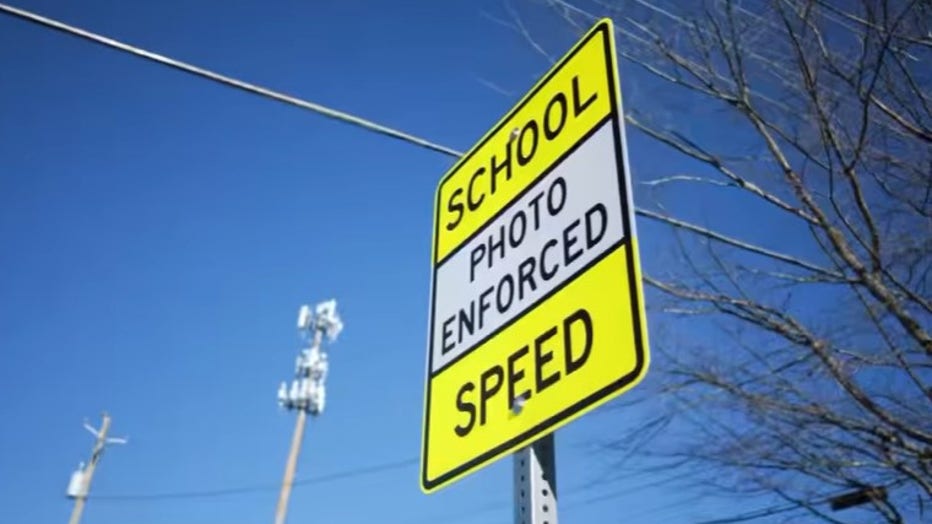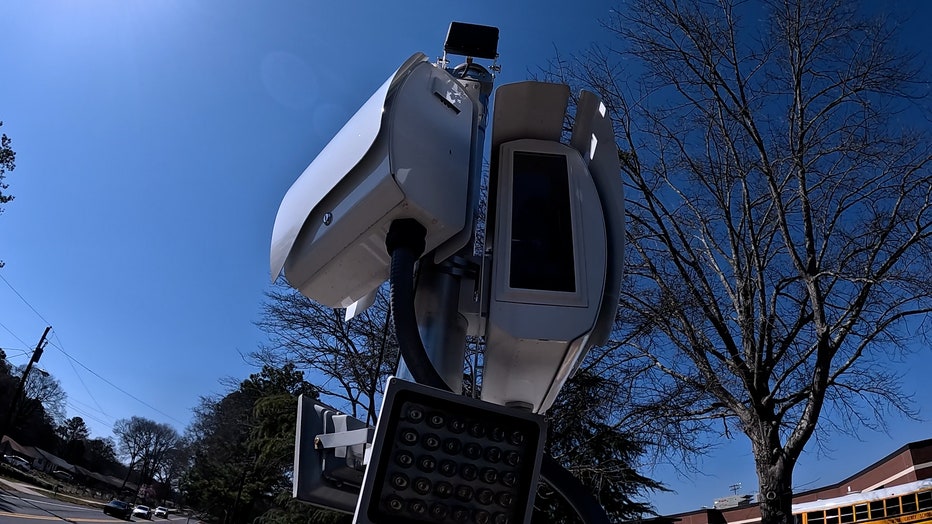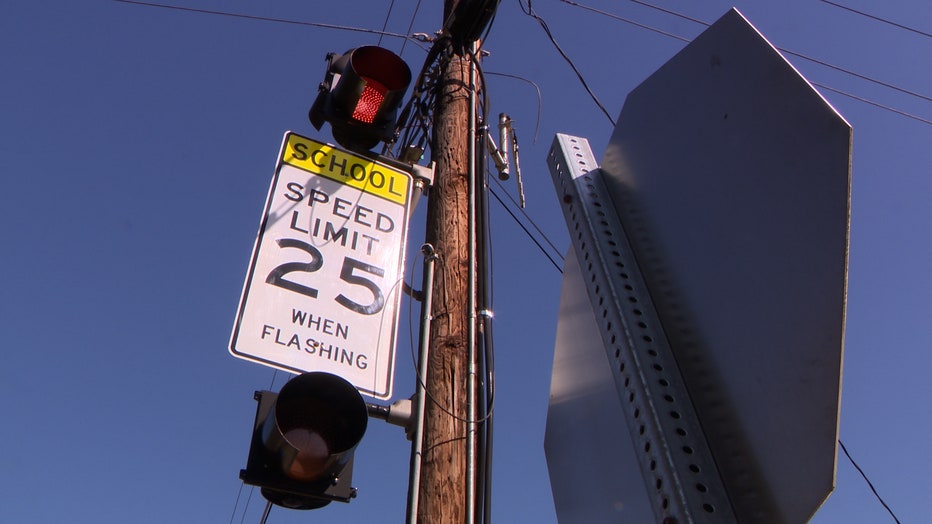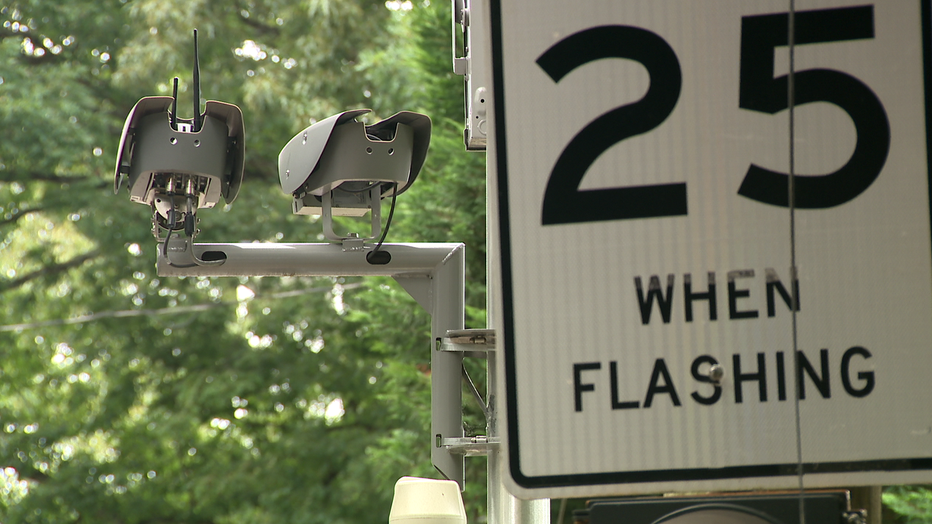School zone camera bills: One to ban them, one to reform. But both overturn the system

I-Team: Banning School speed zones cameras?
For years, they?ve been popping up all over the state. Automated cameras to tag speeders and keep school zones safe. But they?ve generated never-ending complaints to lawmakers. This year the Georgia legislature could take action to reel back school zone speed cameras.
ATLANTA - In the debate over what to do with school zone speed cameras popping up all over Georgia, the state House of Representatives has approved two solutions to the same problem.
On Tuesday, lawmakers approved one bill that outlaws the cameras – overturning the 2018 law that allowed automated ticketing systems near schools. The other bill would let them stay, but with a list of restrictions on when they can operate, how to warn oncoming traffic and what can be done with the proceeds.
But the FOX 5 I-Team has learned that even the reform bill would effectively overturn the system. Under its current language, there would be no penalty if a ticketed driver decided to toss his citation in the trash.
SEE ALSO: 2 school zone speed camera bills pass House, move to Georgia State Senate

The automated speed zone cameras on Memorial Drive are managed by Arizona-based Verra Mobility, which contracts with Atlanta Public Schools. (FOX 5)
‘Deceit and trickery’
The backstory:
In 2018, then-Speaker of the House David Ralston worked with his Senate counterparts, during the final minutes of that year's session, to pass a bill that allowed school zone speed cameras. One of the lobbyists pushing the bill was Ralston's son, Matt.
The stated purpose was to slow traffic near schools, protecting students, parents, and school personnel. But critics claim the real motive has been easy revenue for local governments and private, out-of-state speed camera companies.
"We can safely say that fines have been issued at a level in excess of $200 million," state Rep. Dale Washburn, R-Macon, told his House colleagues Tuesday. "The school zone cameras are taking a percentage of that. Using a conservative estimate, they’ve probably taken $50 million out of Georgia."
Over the past seven years, complaints have poured in to lawmakers about the automated tickets. Drivers have claimed they were ticketed outside of school hours or on weekends, that cameras are set up on busy four-lanes where children don’t walk, and that signage is too confusing.
The FOX 5 I-Team identified cameras in three cities where timing disconnects between cameras and flashing school zone lights misled drivers into speeding, or caused them to be cited them for speeding when they weren’t. The I-Team’s stories led to more than a half a million dollars in refunds for drivers.
"When people are being entrapped and issued tickets, with deceit and trickery, it is wrong," Washburn said in a House Motor Vehicles committee meeting last month. "And it’s something we need to do something about."
Washburn introduced House Bill 225, which overturns the 2018 law. It would require police departments statewide to shut down the cameras entirely.
State Rep. Alan Powell, R-Hartwell, with the support of current Speaker of the House Jon Burns, introduced House Bill 651, which salvages the camera systems, but with strict guidelines.

(Sandy Springs Police Department)
Two options for the Senate
By the numbers:
The votes Tuesday showed more appetite for the reform bill than the total ban.
Washburn’s bill passed by a vote of 129 to 37.
Powell’s passed 164 to 8.
Both bills now move to the state Senate, which can grapple with the issue and make adjustments, additions and subtractions of its own.
Washburn said he does not think senators will be swayed by which bill got the most votes Tuesday.
Tickets from school zone cameras are civil citations, not criminal. They don’t put points against drivers’ licenses and they can’t lead to jail time.
"I'm not sure that they'll pay that much attention to that," he said. "My goal is to get over to the Senate now, and begin to talk to some individual senators, and to talk to their leadership, and try to convince them that banning these school zone cameras is a good thing."

These cameras clock drivers passing by Riverdale High School, and like others in the area, have been generating speeding citations based on the wrong speed limit, a FOX 5 I-Team investigation found. (FOX 5)
What the reform bill does:
Powell called his bill "a second choice."
House Bill 651 would limit ticketing to two-hour periods on mornings and afternoons, when school starts and lets out.
"A lot of the jurisdictions were running these around the clock, through the day, sporting events," Powell told the I-Team. "It just became suspect. It became a 'gotcha.’"
His bill also requires feedback signs, informing oncoming drivers of their speeds before they pass a camera.
It requires half of a jurisdiction’s speed camera ticket proceeds to go to local schools, to be used for school safety. It applies "speed trap" rules on cities and counties, setting limits on how much a government can collect from citations, in relation to their police budget – no more than 35 percent.
The bill eliminates $25 administrative fees that inflate citation amounts. So tickets can cost no more than $75 for a first violation and $125 for a second.
Under the bill, when the tickets arrive in the mail, the envelope has to be clearly marked, so as not to be confused with junk mail.
"The bill I passed was pretty radical about putting guardrails around this," Powell said.
But actually, he acknowledged to the I-Team, ticketed drivers could treat the citations like junk mail.
House Bill 651 eliminates the section of current law that allows cities and counties to send unpaid school zone tickets to the state Department of Revenue, which then blocks car tag renewals until the tickets are paid.
Tickets from school zone cameras are civil citations, not criminal. They don’t put points against drivers’ licenses, and they can’t lead to jail time.
"If it doesn't go through the Revenue Department, who's to push anybody to pay," Powell said. "Either bill, we're getting to the same conclusion."

An analysis by the FOX 5 I-Team found thousands of speed camera citations issued in Riverdale were out of sync with school zone flashers like this one, which tell drivers when the speed limit dips to 25. (FOX 5)
Keeping school zones safe
The other side:
Bob Dallas, a former Governor’s Office of Highway Safety director who’s now a lobbyist for camera company Blue Line Solutions, said the company opposes many of the points in Powell’s bill. (And it opposes Washburn’s bill entirely.)
Dallas said, to keeps school zones safe, ticketing should be allowed throughout the school day. Children and parents come and go from a school building all day, he said.
He said Blue Line supports the warning devices, would agree to pay for them, and would also agree to requiring flashing school zone lights wherever automated cameras are placed.
The company opposes the 35-percent rule on revenues, which Dallas said would negatively impact smaller jurisdictions.
And Blue Line wants to keep the system of sending unpaid tickets to the Department of Revenue.
Washburn’s ban bill received pushback on the House floor Tuesday. A lawmaker who represents South Fulton brought up the death of an 11-year-old outside Sandtown Middle School in 2018. A speeding car struck the car the girl was riding in.
"Is it not true that I shared with you that I was on the scene the day that a young middle school student was killed by a speeding driver ...?" State Rep. Robert Dawson, D-Atlanta, asked Washburn.
"It is a terrible tragedy whenever a child is killed," Washburn responded. "But I must say that there is little evidence that the cameras would have prevented that tragedy."

To operate these cameras in the Drew Charter school zone, Atlanta Public Schools applied for a permit from the Georgia Department of Transportation. (FOX 5)
Sizable campaign donations
Dig deeper:
Still to be determined as the Senate considers the bills: How much will some very large political donations factor into the outcome? That includes some sizable donations made to the head of the Senate, Lt. Gov. Burt Jones.
For years, private camera companies have poured hundreds of thousands of dollars into campaign coffers and political committees.
"They have given a lot of money here," Washburn said. "It’s obviously very important to them, because they're making a lot of money. And so they are spending a lot of money.
"But the money they’re spending is a very small percentage of the money they’re taking out of Georgia."
The I-Team examined the past four years of donations from three major companies – RedSpeed, Blue Line Solutions and American Traffic Solutions, or Verra Mobility.
The total: $728,250.
More than half of that – $400,200 – poured in since February 2024, when now-retired state Rep. Clay Pirkle first floated a bill to ban the cameras entirely.
Since 2021, there’s been $215,000 donated to the Georgia House Republican Trust, with a lion’s share ($150,000) given by RedSpeed. Another $110,000 went to the Georgia Republican Senatorial Committee.
Lt. Gov. Jones’s leadership committee received $171,000, also mostly from RedSpeed, and his campaign received another $38,500.
Jones’s office didn’t respond to a request for comment on the donations, but he said in a written statement to the I-Team, "I believe that school safety is a critical issue we must address through a variety of initiatives."
The I-Team also found $16,500 in camera company donations to Rep. Powell.
"I think if you looked at the outcome (Tuesday), political donations don't carry any weight about doing the right thing," Powell told the I-Team. "You saw two bills passed that's going to probably put these folks out of business in Georgia."
Dallas, the lobbyist, described the donations as camera companies’ way of reaching out to policymakers to educate them on the issue. "What’s happening – an industry representing it’s desire to make school zones safe," he said.
READ MORE:
- School zone speed cameras clash: Georgia lawmakers to debate on ban vs. reform
- Fight to ban school zone speed cameras begins in Georgia House
- Ga. lawmaker aims to shut down school zone speed cameras
- I-Team: Thousands ticketed by school zone cameras set up further from the school than law allows
- After I-Team investigations, ATL and Riverdale to automatically refund drivers wrongly ticketed by speed cams
The Source: The FOX 5 I-Team has been reporting on problems with school zone speed cameras for more than a year, discovering thousands of erroneous tickets issued in Atlanta, Jonesboro and Riverdale. I-Team reporter Johnny Edwards has been tracking bills dealing with the cameras at the state Legislature. He was at the Capitol for Tuesday’s vote on two bills and interviewed the sponsors of both.

